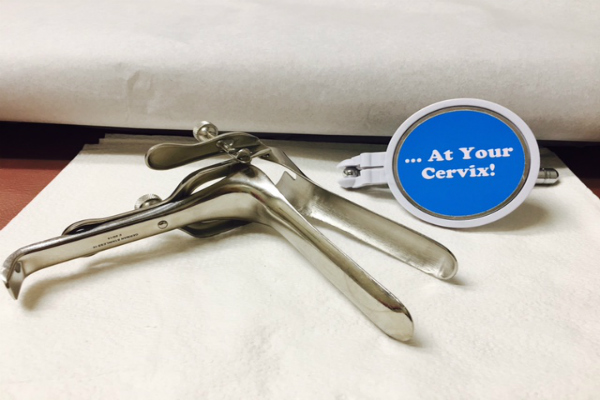
Tagg Nation Episode 69: NFL Protests, 8-Year-Old Drag Queen, Biphobia and More
October 4, 2017
Cuties Connect at LA’s New Queer Coffee Shop
October 6, 2017Gynecological care is an important part of healthcare for anyone that has a uterus and/or ovaries. This is
certainly not limited to only cisgender women, as many transmen and non-binary individuals are also in
need of GYN care. However, many people may be hesitant to schedule these appointments if they have
previously experienced poor quality interactions with medical professionals, as these type of services can
bring up feelings of vulnerability.
How often do I need to be seen?
Even if you’re not due for a Pap smear test, we like to see folks every year for an annual exam, even if
you have no concerns. It’s also an opportunity for your GYN provider to offer a more thorough physical
exam or run primary care screening tests if you do not have a primary care provider.
Breast/chest exams
Breast/chest exams by a trained clinician are a recommended component of the annual GYN visit to
screen for cancer. This involves both visualization as well as palpation. A recent change in this area of
health is the monthly self-breast/chest exam, which is no longer recommended, as long as patients are
receiving regular check-ups from their provider. Newer research found an association between
breast/chest self-exams and high rates of unnecessary invasive testing, without an improved cancer
detection rate. Instead, clinicians now encourage general breast/chest self-awareness (instead of a
formal, monthly self-exam) so that patients can get to know their normal baseline.
Paps smears
Pap smears are a screening test developed to help detect cervical cancer and are recommended for any
person who has a cervix, usually up until age 65. They are not recommended for anyone under 21
regardless of sexual activity. While many people are under the impression that Paps must be done yearly,
newer evidence supports a reduced frequency for testing. Best practice currently recommends performing
Pap smears without HPV testing every 3 years for those under the age of 30 and Pap smears with HPV
testing every 5 years for those over the age of 30. If cervical cell abnormalities are detected, the
laboratory will add on HPV testing automatically. If a clinician tells you your Pap smear results have come
back abnormal, they may recommend repeating your Pap more frequently or referring you for a
procedure called a colposcopy, which examines your cervical cells under a microscope.
Abnormal Pap smears rarely indicate current cervical cancer and most often suggest a low-level infection or the
beginning of atypical cellular changes. This is similar to keeping an eye on a new mole that appears on
your body—the majority are completely benign and non-cancerous—but we continue to observe. Paps
can also detect the presence of human papillomavirus (HPV), which we know to be the primary cause of
cervical cancer. Although there are many strains of HPV, only a few are linked to cervical cancer.
However, some benign strains may cause genital warts. Most people who come in contact with HPV will
spontaneously clear the virus, which is why it’s not routinely screened for in those under age 30.
Pelvic Exams
A complete pelvic exam includes visualizing the external genitalia, a speculum exam (the metal or plastic
instrument that is used to look at the cervix) for internal visualization, and a manual assessment of the
uterus and ovaries via vaginal exam. Not all components of a pelvic exam are necessary at each visit and
if the client has no concerns and is not due for a Pap smear, it may be appropriate to forgo both the
speculum and manual exam. Historically, the complete pelvic exam was recommended for all annual
visits, however new research has questioned the relevance of routine speculum and internal exams in the
absence of any problems. Current guidelines recommend at least visualizing the external genitalia
annually and adding the internal exams when patients require a Pap smear or if they have symptoms or
concerns. If you have questions about any part of the pelvic exam, feel free to bring it up with your
provider at your next visit.
STI testing
It may also be appropriate to test for sexually transmitted infections (STIs) if a person has a current
partner or partners that they engage with sexually, regardless of their gender. Through a combination of bloodwork, vaginal cultures, and urine samples, we can test for chlamydia, gonorrhea, HIV, hepatitis B and
C, syphilis, and trichomoniasis. It is not recommended to routinely test for herpes unless someone
develops a lesion. The frequency of STI testing depends on a number of factors and individuals should
ask their providers about current recommendations based on their unique history. However, STI testing is
always recommended whenever a person has a new sexual partner or if they have any concerns of STI
exposure.
Addressing other concerns
Even if you don’t have any immediate concerns, this visit can also be a great time to bring up other topics
about your health. Common concerns my patients often ask about include sexual pain, arousal/libido,
anxiety, depression, and gastrointestinal issues. While we might focus on and specialize in breast/chest
and pelvic-related care, our goal is to approach you as a whole being. All of the organ systems within the
human body are interlinked and reliant on each other to function properly, so it’s important for us to have a
complete picture of your overall health, even if it doesn’t seem related to pelvic care. If we don’t have the
answer, we are happy to be your point of contact and refer you to someone who does specialize in what you
need.
Make sure to find a good provider who you feel comfortable asking questions and remember you
always have the right to opt out of certain exams or procedures and to clarify with your provider
beforehand!
Signey Olson is a DC-based nurse practitioner and nurse-midwife whose work focuses on providing inclusive care to her queer community. She works primarily in GYN, fertility, and trans-affirming care.





